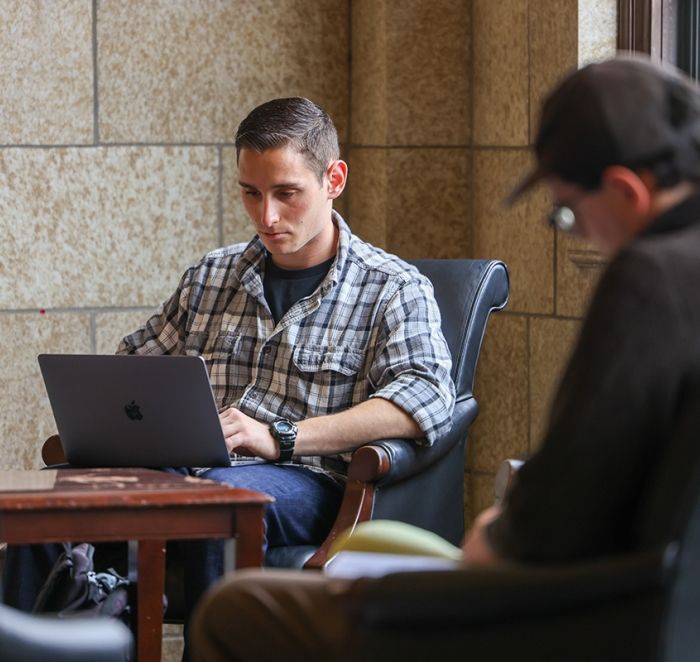Prof. Hutter Calls on Prof. Breger's Implicit Bias Scholarship in Court
Professor Michael Hutter speaks up for those who need an advocate.
However, even the most seasoned legal travelers need expert guidance on the trails of statutes, laws, preferences, and precedence from time to time.
So, when Hutter was called upon to conduct oral arguments before the New York State Supreme Court Appellate Division, Third Department, on behalf of Byung Choon Joe last year he tapped a colleague’s research on implicit bias for some help.
The case
Joe sustained wrist and back injuries after falling from scaffolding while working as a New York State maintenance worker in 2013, according to court records. On the ensuing trip to the emergency room he was not offered a translator despite not speaking English. It is possible he may not have understood many of the questions asked of him during that visit, attorneys said.
Not able to work, Joe took the State to court for medical expenses, pain, and suffering. His lawyers argued that the state was in violation of Labor Law 240, which relates to scaffolding safety.
Originally argued before the Court of Claims, the State of New York was found to be in violation of the law and covered the costs of Joe’s medical expenses.
In the underlying trial court decision, the court specifically noted that Joe is Korean-born.
The lower court’s decision states, “The Court found claimant's testimony to be unpersuasive and, in great measure, incredible and unworthy of belief. His testimony was riddled with exaggerations, inconsistencies and lapses of memory, and, in several instances, given in contrast to or in contradiction of his admitted medical records and of testimony provided by his medical expert and by his rehabilitation and vocational expert.
“The untrustworthy nature of claimant's trial testimony was reinforced time and again by repeated examples of claimant's apparent dishonesty or disingenuousness in representations he made, or in behavior he exhibited, subsequent to his accident.”
The appeal
This led to an appeal and Hutter’s involvement.
The appeal argued that Joe was entitled to more compensation as his injuries were severe enough that he was unable to work. Joe’s attorneys argued that the lack of translation services meant his concerns were not initially heard and therefore, not properly treated.
In his argument, Hutter focused on that note of “Korean-born.” Joe has lived in New York City for 25 years – in a the heavily-Korean Queens’ neighborhood in Flushing – and even though he does not speak English, Hutter said, that’s all that the court needed to note, not his birthplace.
During the appeal arguments last summer and again this past winter, implicit bias concerns about the decision were raised related to Joe’s Korean heritage.
Hutter said, “It’s kind of unusual to have mentioned his country of origin here. Does that indicate implicit bias?” Did that [implicit bias] play a role here? That’s the question. It may be on further analysis that it’s not, but it has to be scrutinized.”
“The key is, being patient and looking at this thoroughly,” Hutter asked the court. “That’s all I can ask you, to look at that possibility as a result of the fact finding. It’s a gratuitous comment that has nothing to do with the case. The court ought to take that into consideration.”
The research
Joe’s appellate brief included, many expert sources to support the claim that implicit bias occurred.
Among those was Albany Law’s own President William McKinley Distinguished Professor of Law Melissa Breger. Specifically, Breger’s article, “Making the Invisible Visible: Exploring Implicit Bias, Judicial Diversity, and the Bench Trial,” University of Richmond Law Review, Vol. 53, No. 1039, 2019.
Overall, the research supports the argument that litigants can be affected by implicit biases in various stages of cases.
“[I used] her article as a road-map for the presentation of the argument,” Hutter said. “Reliance on the article by [the claimant] shows academic scholarship is read and relied upon by the bench and bar in their legal practice and judging.”
One of the details from Breger’s article that Hutter used states, “When one is a judge and a sole finder of fact, even if the decision maker is unaware that bias could be shaping the outcome, the consequences can be serious. Thus, it follows that ‘the existence of unconscious bias carries a potentially powerful impact in legal proceedings, where the public has put its trust in the judicial system to achieve a fair result.”
Breger also wrote, “Unlike explicit biases, however, often the person holding the implicit bias does not consciously recognize it and would deny harboring such biases, if asked. Similarly, people are often unaware of the impact of these biases upon their own decision making. Implicit bias may reveal itself when individuals resort to preconceived notions or assumptions about particular groups, such as those defined by gender, gender identity, race, or culture, automatically, without reflecting methodically upon what they are actually thinking.”
Breger appreciated Hutter’s use of her work.
“It is so gratifying to see my research being used in our courts—and especially by my colleague—to assist in hopefully setting a standard for calling out implicit bias and working to interrupt bias” she said. “Each case seen before the courts is progress.”
The results
For Joe’s case specifically, there was a final decision made by the court in early March, but, there are bigger ramifications of Hutter’s argument and Breger’s research.
In June 2020, Chief Judge Janet DiFiore called for an independent review of the court system’s policies and practices related to issues of bias, racism, and disparities.
In late 2021, DiFiore’s “Equal Justice in the New York State Courts: 2021 Year in Review” report found progress has been made with many of the recommendations made by the independent review. The actions are expected to continue.
“Importantly, [this] work cannot and will not cease when the Equal Justice recommendations are all implemented. Our commitment to equal justice must be an ongoing, open-ended process in which we continuously strive to achieve the highest standards of fairness, equality and meaningful inclusion within our court system,” DiFiore wrote.
Then, again, in her 2022 State of the Judiciary Address on February 16, DiFiore stressed the need for continued efforts to reduce racial disparities in the courts. She specifically noted that the plan to consolidate the state’s trial court system would improve the current “rigid and fragmented” structure and its impact on vulnerable families. She called for legislative action on a proposal to its streamline operations.
Evidence for these changes include cases like Joe’s, where bias is noted, heard, and analyzed by the courts.
“The decision made by this court had the power to serve as a backdrop for what courts can do in the future,” Hutter said of the decision in the Joe case.
“A big question is how do you get your point across and prove that this is happening? Professor Breger’s argument does this very well. It made me proud to argue the scholarship of a colleague,” he said.






